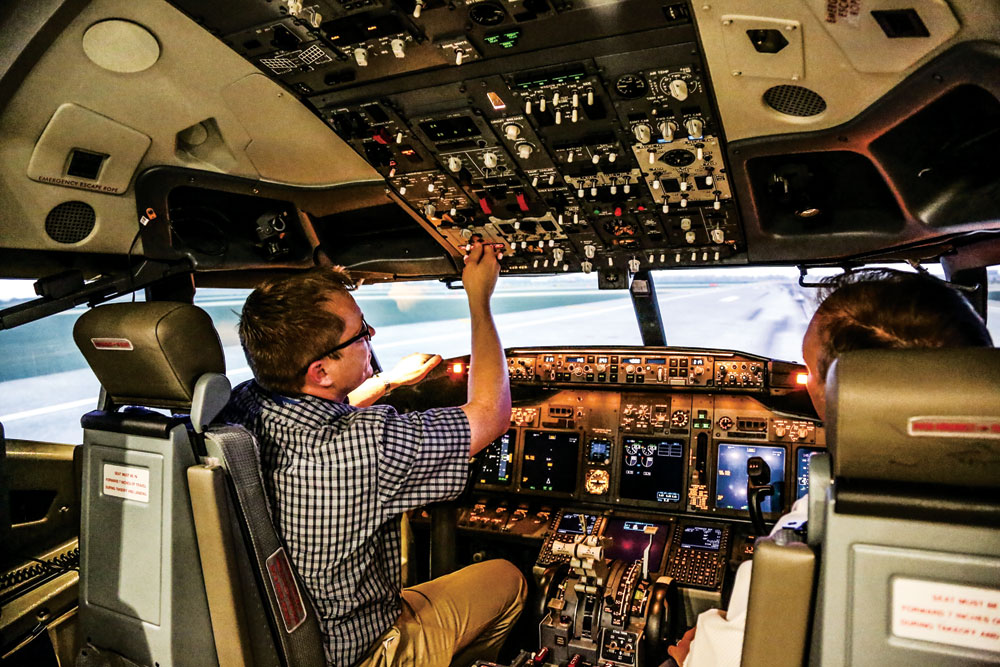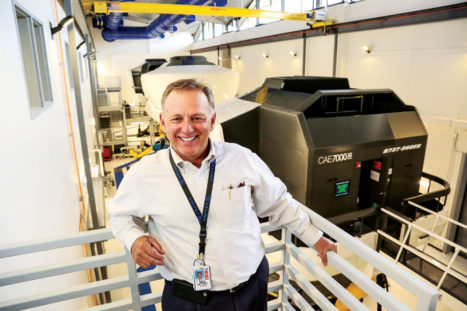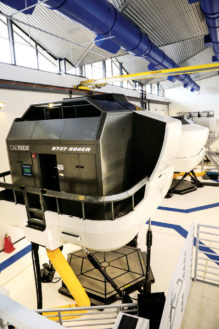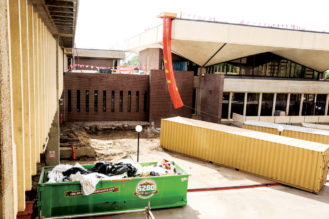
Jared Peterson, training program manager for 737s, demonstrates the operation of a 737 flight simulator. Over 12,000 United pilots participate in a training session every 9 months, making 16,000 annual visits to the facility for training stints that range from a few days to a month. To keep up with demand, the simulators operate from 6am to 2am 362 days a year.
Stapleton residents may have recently noticed the hubbub of activity at 7500 E. 35th Ave., across from Swigert International School and Denver Discovery School. Men in vests stop traffic to make way for the heavy machinery that is part of the significant renovation of the 400,000- square-foot facility.

Captain Mike McCasky, managing director of flight training, says the visuals in the simulators are so good it’s like flying a real plane. After a 30-day training program for a new aircraft in FAA certified simulators, pilots are ready to go and fly the planes.
Although the construction commotion makes it appear that a major physical expansion is occurring, “We actually aren’t going to change the overall footprint of the structure,” said Erin Benson, public relations manager for United Airlines. “It’s just really a renovation.”
United Flight Simulator from Steve Larson on Vimeo.
This renovation will nearly double the number of flight simulators at the facility, however, bringing a total of 32 online. The simulators will represent all the different fleet types that United flies, including the Boeing 787, 777 and 737, said Benson.
All of United’s current 12,000 pilots—both new hires and returning ones—will train at the Denver facility, and some flight attendants as well. Training schedules vary greatly depending on the status and needs of the participants, said Benson, but the simulators will operate from 6am to 2am almost every day of the year.
In the past, pilot training was also conducted in Chicago and Houston, but in a deal made with the city of Denver last year, United has consolidated all its training operations in our backyard.

All of the simulators at the facility are airplane-specific, like this one for 737s. With over 330 737s in operation flown by 4,500 pilots, 737 is a popular model in the United fleet. The newer flight simulators use electromagnetic pulses rather than hydraulics to generate motion.
By the end of the renovation, the facility will hold 32 simulators “We’re building a future in our facility for the next 40 years,“ said Graham Smith, senior project manager at United’s Flight Training Center in Stapleton.
“We did a thorough review and evaluation of several different options that included building a new facility in Denver, Chicago or Houston as well as improving the facilities in Denver or Houston,” said Benson. Renovating in Denver will allow them to complete construction about two years earlier than other options, said Benson, while minimizing disruption and displacement of staff.
The state, the city, the airport and other partners put together an incentive package to entice United to stay in Denver. The City and County of Denver provided about $4 million and the state about $9.2 million in performance-based contracts, so United has to meet specific milestones to receive ongoing funding, according to Derek Woodbury, of the city’s Office of Economic Development (OED).
“United Airlines is a very important partner to the City and County of Denver and to the airport,” said Turid Nagel-Casebolt, OED director of business development. “Including the airport operations, they are actually our No. 1 non-retail private employer in Denver.”
She expects the consolidation will bring 250 additional jobs to the area, on top of the 400 jobs the training center currently provides. In addition, according to Nagel-Casebolt, United training management expects full consolidation to result in the need for 450 local hotel rooms a night to accommodate visiting pilots, some along the Quebec corridor.
“We view it as an important employment center and a community cornerstone of the redevelopment of Stapleton,” said Nagel-Casebolt. She also expects that the expanded training center will contribute to activating the Central Park Station and transit-oriented development opportunities around Central Park Station.

Renovations to the 23-acre campus are on track to be completed by late 2017, except for some exterior site work.
The project should be completed by the end of 2017. “They have been following through on their milestones and the project is moving ahead beautifully,” noted Nagel-Casebolt.



0 Comments